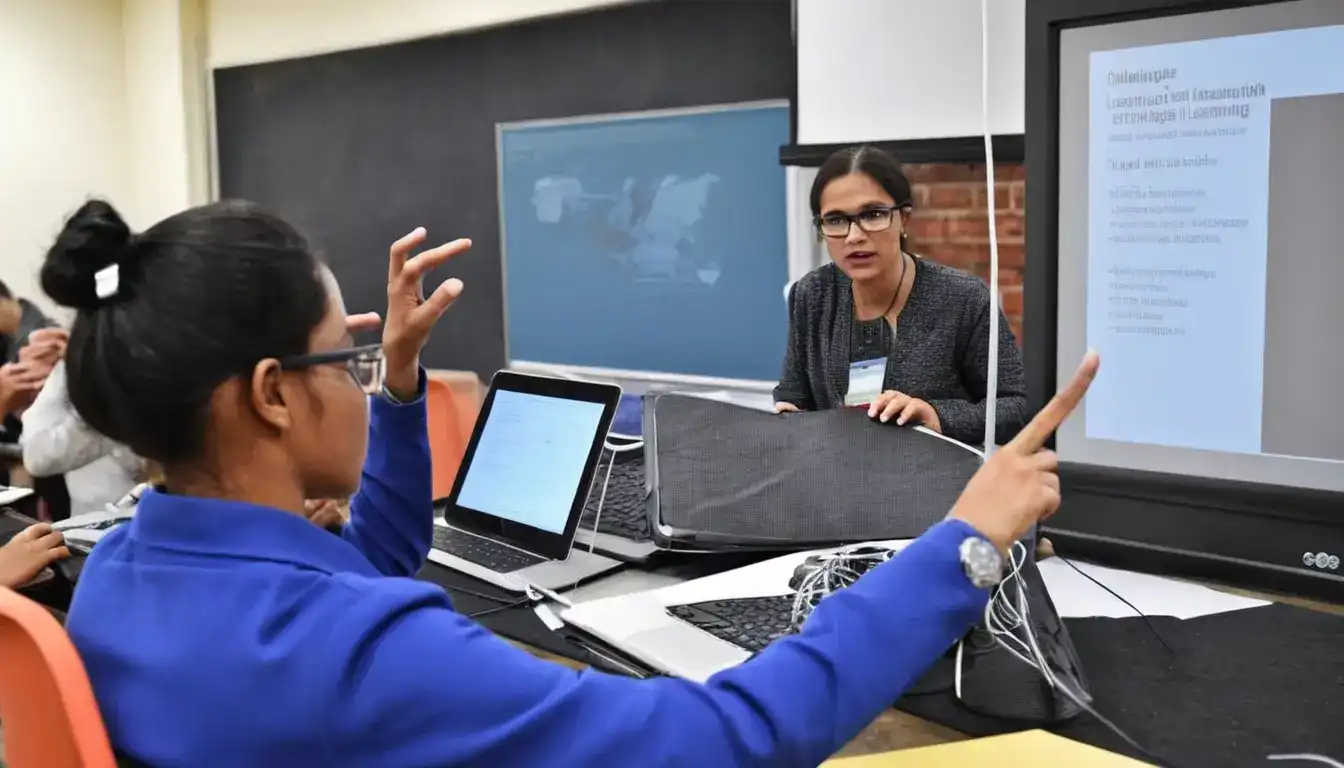Developing Critical and Analytical Skills in Schools
Emily Willis

Photo: Developing Critical and Analytical Skills in Schools
In today's rapidly evolving world, the ability to think critically and analyze information is more crucial than ever. Schools play a pivotal role in nurturing these skills among students, preparing them to navigate complex challenges and make informed decisions in their academic, professional, and personal lives. This article explores the importance of developing critical and analytical skills in schools, effective strategies for fostering these skills, and the long-term benefits for students.
Importance of Critical and Analytical Skills
Critical thinking and analytical skills encompass the ability to evaluate information objectively, analyze its relevance and reliability, and form reasoned judgments or solutions based on evidence. These skills are essential for:
Problem-solving: Students learn to identify issues, break down complex problems into manageable parts, and devise effective solutions.
Decision-making: By weighing different perspectives and considering implications, students can make informed decisions that align with their goals and values.
Creativity: Critical thinking fosters creativity by encouraging students to explore new ideas, challenge assumptions, and innovate in various fields.
Effective Communication: Analytical skills enable students to articulate their thoughts clearly, support arguments with evidence, and engage in constructive dialogue.
Strategies for Developing Critical and Analytical Skills
1. Encourage Questioning and Curiosity
Foster an environment where questioning is encouraged, and curiosity is nurtured. Encourage students to ask "why" and "how" to stimulate critical inquiry and deepen their understanding of concepts.
2. Promote Evidence-Based Reasoning
Teach students to evaluate information critically by assessing the credibility, relevance, and accuracy of sources. Emphasize the importance of evidence-based reasoning in forming opinions and making decisions.
3. Integrate Problem-Based Learning (PBL)
Implement problem-based learning approaches where students tackle real-world problems or scenarios. PBL encourages collaborative problem-solving, critical analysis of issues, and application of knowledge in practical contexts.
4. Use Socratic Questioning
Utilize Socratic questioning techniques to stimulate critical thinking. Encourage students to explore underlying assumptions, analyze implications, and consider alternative perspectives through guided questioning.
5. Provide Diverse Perspectives
Expose students to diverse viewpoints, cultural perspectives, and interdisciplinary approaches. Encourage discussions that challenge preconceptions and broaden students' perspectives on complex issues.
6. Engage in Analytical Writing
Promote analytical writing assignments where students analyze texts, data, or case studies. Encourage structured reasoning, logical argumentation, and the use of evidence to support their interpretations and conclusions.
7. Utilize Technology and Multimedia
Integrate technology and multimedia resources that facilitate interactive learning experiences. Virtual simulations, data visualization tools, and multimedia presentations can enhance students' analytical skills by providing hands-on, experiential learning opportunities.
Benefits of Developing Critical and Analytical Skills
1. Enhanced Academic Performance
Students with strong critical thinking and analytical skills demonstrate higher academic achievement across subjects. They can comprehend complex concepts, engage deeply with course materials, and excel in assessments that require reasoned analysis.
2. Preparation for Career Success
Employers value employees who can analyze information, solve problems creatively, and make informed decisions. Developing these skills in school prepares students for future careers in diverse fields such as STEM, business, healthcare, and the arts.
3. Lifelong Learning and Adaptability
Critical thinking skills empower students to become lifelong learners who seek knowledge, evaluate new information critically, and adapt to changing circumstances in their personal and professional lives.
4. Civic Engagement and Global Citizenship
Analytical skills enable students to evaluate social issues, understand diverse perspectives, and actively participate in civic engagement. They become informed global citizens who contribute positively to their communities and society at large.
Conclusion
In conclusion, developing critical and analytical skills in schools is essential for preparing students to thrive in a complex and interconnected world. By fostering a culture of inquiry, promoting evidence-based reasoning, and providing diverse learning experiences, educators empower students to become critical thinkers, effective problem-solvers, and lifelong learners. These skills not only enhance academic performance but also equip students with the tools needed to succeed in their careers, engage meaningfully in society, and contribute to positive social change. As we continue to prioritize the development of critical and analytical skills in education, we pave the way for a future generation of thoughtful, informed, and empowered leaders.
Latest ✨
View Allvibrant cultures of Mexico, China, and India, highlighting their unique customs, traditions, and ways of life. It emphasizes the importance of immersing oneself in these cultures to connect with the soul of a place and create lasting memories.
Emily Willis
Virtual reality (VR) and augmented reality (AR) are transforming the entertainment industry by offering immersive experiences that blur the lines between the real and virtual worlds. VR completely transports users into computer-generated environments, while AR overlays digital elements onto the real world.
Emily Willis
The Pacific Ocean is home to remote and enchanting islands that offer untouched natural beauty, rich cultures, and unique experiences for adventurous travelers. Tips for exploring these hidden gems include researching your destination, packing light, respecting local culture, exploring responsibly, and staying safe.
Emily Willis
concept of "sports for social good," which uses the power of sports to address social issues and create positive change. It highlights the impact of sports on diversity, gender equality, youth development, community engagement, health, and peacebuilding.
Emily Willis
Business
View All
August 5, 2024
How to Create Engaging Content and Convert Visitors to Customerscreating engaging content to attract and retain customers in the digital age. It provides strategies for understanding the audience, setting content goals, creating high-quality content, using storytelling and emotional connection, and optimizing content for conversions. It also covers content formats and distribution, measuring and analyzing content performance, and building relationships with influencers and user-generated content.
Emily Willis

August 5, 2024
How to Improve Your Leadership Skillsleadership skills in achieving organizational success. It discusses various aspects of leadership, including understanding leadership, identifying leadership styles, developing effective communication skills, building trust and credibility, developing emotional intelligence, delegating tasks effectively, embracing continuous learning, fostering a positive work culture, making tough decisions, developing a growth mindset, and building a strong team.
Emily Willis

August 5, 2024
Master Your Business Financial Plan in 5 Stepssecrets to mastering your business financial plan with five simple steps. Learn how to analyze financial data, set measurable goals, and create a comprehensive strategy for success. Unlock profitability, make confident decisions, and ensure a bright future for your business
Emily Willis
Economy
View AllBest Secured Loans for Debt Consolidation with Low Interest Rates | Compare Top Lenders & Save Money on Monthly Payments
Read MoreThe digital economy is rapidly changing the job market, with trends such as remote work, the gig economy, automation, e-commerce, cybersecurity, digital skills, and changes in traditional industries having significant implications. These trends offer both opportunities and challenges, requiring individuals and organizations to adapt by embracing flexibility, investing in continuous learning, and staying abreast of technological advancements in order to thrive in this evolving landscape.
Read MoreIn today's rapidly changing economic landscape, innovation and resilience are more important than ever. Innovation drives progress and competitiveness by creating new ideas and solutions to meet market needs. Resilience helps businesses withstand shocks and bounce back from setbacks by planning strategically and diversifying resources.
Read MoreEntertainment
View All
August 4, 2024
The Latest Music Trends, Artists Influencing Pop Culture, and How Digital Platforms Facilitate the Distribution of Music GloballyThe music industry is constantly changing due to consumer preferences, technology, and the influence of artists. Digital platforms have revolutionized music creation, distribution, and consumption, leading to genre fusion, the rise of independent artists, and collaborative projects. Influential artists like Billie Eilish, BTS, and Taylor Swift have shaped pop culture globally. Streaming services, social media, and direct-to-fan engagement have transformed music distribution. Digital platforms also promote cultural diversity and inclusivity, expand markets and revenue, and drive technological advancements. The industry is also focusing on sustainability and ethical practices. To succeed in the future, stakeholders must embrace digital transformation and champion inclusivity.
Emily Willis

August 5, 2024
Video Games: Enduring Appeal, Immersive Worlds, and Diverse Genresenduring appeal of video games, highlighting their ability to transport players to fantastical realms, challenge their minds, and foster connections with others. It explores the magic of immersive worlds, the vast array of genres available, and the social power of gaming.
Emily Willis

August 5, 2024
Music Universal Language: Connecting and Inspiring Across CulturesMusic has the power to transcend language barriers and connect people on a deep emotional level. It serves as a bridge between cultures, fostering understanding and appreciation for diversity. The universality of rhythm and melody creates a sense of unity, while the diversity of musical styles allows for exploration and creativity.
Emily Willis
Health
View AllRegular exercise is essential for maintaining both physical and mental health. It helps with weight management, cardiovascular health, muscle strength, energy levels, and sleep quality. Exercise also reduces stress and anxiety, improves mood, cognitive function, and self-esteem, and lowers the risk of depression. Different types of exercises, such as aerobic, strength training, flexibility, balance, and mind-body exercises, contribute to overall health. To start and maintain an exercise routine, it is important to start slowly, set realistic goals, find enjoyable activities, stay consistent, and listen to your body.
Emily Willis
Regular physical activity is crucial for maintaining long-term health and well-being. It has numerous benefits, including improving cardiovascular health, aiding in weight management, enhancing mental health, strengthening bones, boosting immune function, and promoting longevity.
Emily Willis
Quality sleep is essential for overall health and well-being, impacting physical, cognitive and emotional functioning. Lack of quality sleep can lead to a variety of health issues, including weakened immune function, heart problems, weight gain and cognitive impairment.
Emily Willis
Trending 🔥
View All
1
3
4
5
6
7
8
9
10
Lifestyle
View AllTechnology
View All
August 5, 2024
Top Unity Software Development Trends to Watch in 2024
Explore the top Unity software development trends that will shape the gaming industry in 2024. From AI integration to VR/AR immersion, cross-platform reach, cloud collaboration, and mobile gaming, Unity is revolutionizing gaming experiences. Stay ahead in the dynamic world of game development with these insights.

August 5, 2024
Top 10 Steam Games of 2024
Discover the 10 best Steam games of 2024 and embark on an unforgettable adventure. From breathtaking open-world epics to thrilling FPS battles, these must-play games will keep you entertained for hours. Get ready to dive into the exciting world of Steam gaming and discover your next favorite game!

August 5, 2024
Application of IoT in Various Industries
The Internet of Things (IoT) has revolutionized various industries by enabling real-time data collection, analysis, and automation. In manufacturing, IoT has led to smart factories, predictive maintenance, and supply chain optimization. In healthcare, IoT has facilitated remote patient monitoring, smart hospitals, and enhanced patient care.

August 5, 2024
Oculus Quest 2 vs HTC Vive Pro – Which Should You Choose?
Oculus Quest 2 vs HTC Vive Pro – which VR headset reigns supreme? Dive into this ultimate showdown to discover the strengths and weaknesses of each, and decide which one is worth your investment. From specs and comfort to content and price, we'll help you make an informed choice.





















